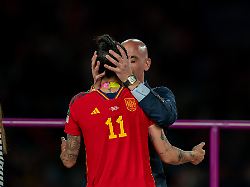Rubiales’ kiss and more
Kraus criticizes male power structures in football
8/30/2023, 6:13 p.m
While women clearly show solidarity with Jennifer Hermoso, some men in football downplay the scandal surrounding Luis Rubiales’ kiss. The scene at the World Cup award ceremony not only puts the previous Spanish association president in trouble, but also stirs up the male-dominated sport.
A kiss occupies the football world. Luis Rubiales forced it on player Jennifer Hermoso. That’s what everyone believes except Rubiales and those closest to him. The consequences: Rubiales suspended, his mother on hunger strike, the opposing players in a boycott. And Spain’s football in the Kulturkampf. The main role is played by the president of the association, Rubiales, who laments “false feminism”. Far beyond the land of the world champions, the debate about power and powerlessness, old structures and long-standing relationships is now raging. Does football, which has long been staged as a male sport, favor a system in which macho culture and abuse of power thrive particularly well?
“It’s not just about this kiss, the issue that football has to deal with is much bigger,” says former HSV manager Katja Kraus. Rubiales embodies an attitude “that entails the right to take what you want because you think you’re entitled to it. It’s just disgusting.”
There are other excitements too. For example, allegations of sexual abuse have been made against Zambia’s national coach Bruce Mwape and Haiti’s president of the association, Yves Jean-Bart. And that Spain’s football has a problem was indicated a year ago when the players rebelled against coach Jorge Vilda’s methods.
Footballers misjudged as “appendages”.
Kraus, active in the “Football can do more” network, which campaigns for more diversity and equality in football, has long complained about “structural discrimination” in the industry. “Everyone who has been in this system for a long time has become part of the power structure,” says Kraus. “Loties have developed that support and protect each other.” More new faces are needed like 41-year-old Lise Klaveness. The president of the Norwegian Football Association had lamented “a century of misogyny” after the kiss scandal.
“Progressive forces have a harder time in football because the sport was and is so male-dominated, both at official and fan level,” explains historian and political scientist Georg Spitaler, who teaches in Vienna. “That makes it harder for feminist causes.” To this day, “images of a rough and quite violent masculinity are staged in football,” says the long-time co-editor of the Austrian football magazine “ballesterer”. Female footballers are still seen as “appendages”.
Men know each other from FIFA and UEFA
In Germany, Karl-Heinz Rummenigge saw the kiss scandal as follows: “When you become world champion, you are emotional. And what he did there is – sorry, with all due respect – absolutely okay”. Emotionality is important in football, one should “leave the church in the village,” said Bayern’s supervisory board member. DFB President Bernd Neuendorf (“I don’t think I would have acted like that”) and BVB boss Hans-Joachim Watzke (“don’t know what happened before”) remained cautious – but they did not openly criticize Rubiales either. For Kraus, part of the problem: “The spontaneous reactions of active officials and the lack of opposition from those who think differently have shown that this male power behavior in football is still accepted.”
Like Rummenigge, Watzke and Neuendorf occasionally meet Rubiales in the bodies of the European Football Union UEFA. Among the 27 most important officials there are three women. Seven out of 37 are at world governing body FIFA. The 20 regional associations of the German Football Association are all led by men. The nine-strong Executive Committee of the German Football League: all male. After all: In the DFB presidium, 4 out of 14 members are women. “That’s more than there used to be,” says Reinhard Grindel. The former DFB President sees the association “on the right track”, the question of treating women with respect is taken into account when filling positions.
A case of Rubiales at the DFB? Inconceivable for the 61-year-old. “An association based on volunteers, where people come from very different areas, finds it easier to deal with such issues.” He knew from conversations with Horst Hrubesch, the women’s national team coach at the time, “that it was always an issue: how do we behave when we go into the locker room?” Grindel explains. “We already had this sensitivity back then, and of course our colleagues have it too today.”
Popp criticizes statements
And colleagues like Rummenigge? “You have to see with Rummenigge: He sits on the UEFA Executive Committee with Rubiales. And Rummenigge is a very loyal man. He’s decent, through and through. But he doesn’t want to publicly give the impression that he’s pushing something into someone,” says Grindel . “I could imagine that he would put it differently today. But I see this statement more as an expression of loyalty to a colleague with whom he is sitting at a table than as a downplaying of the matter itself.”
DFB captain Alexandra Popp believes “that there are still people in many positions who simply do not yet have a future-oriented image. And something simply has to change.” You saw that in the case of “Hermoso in an extreme way, be it with the Spanish association president, be it with the people who applauded him after his speech, be it with the statement by Karl-Heinz Rummenigge, among others”.
That shouldn’t be happening anymore at this point. “We are now in another century, where equality simply has a great, great importance,” said Popp. “The fact that we still have to fight for the fact that, according to many statements, one should actually surrender after something like this is incomprehensible to me and rather shocking that parts of society still think so.”
